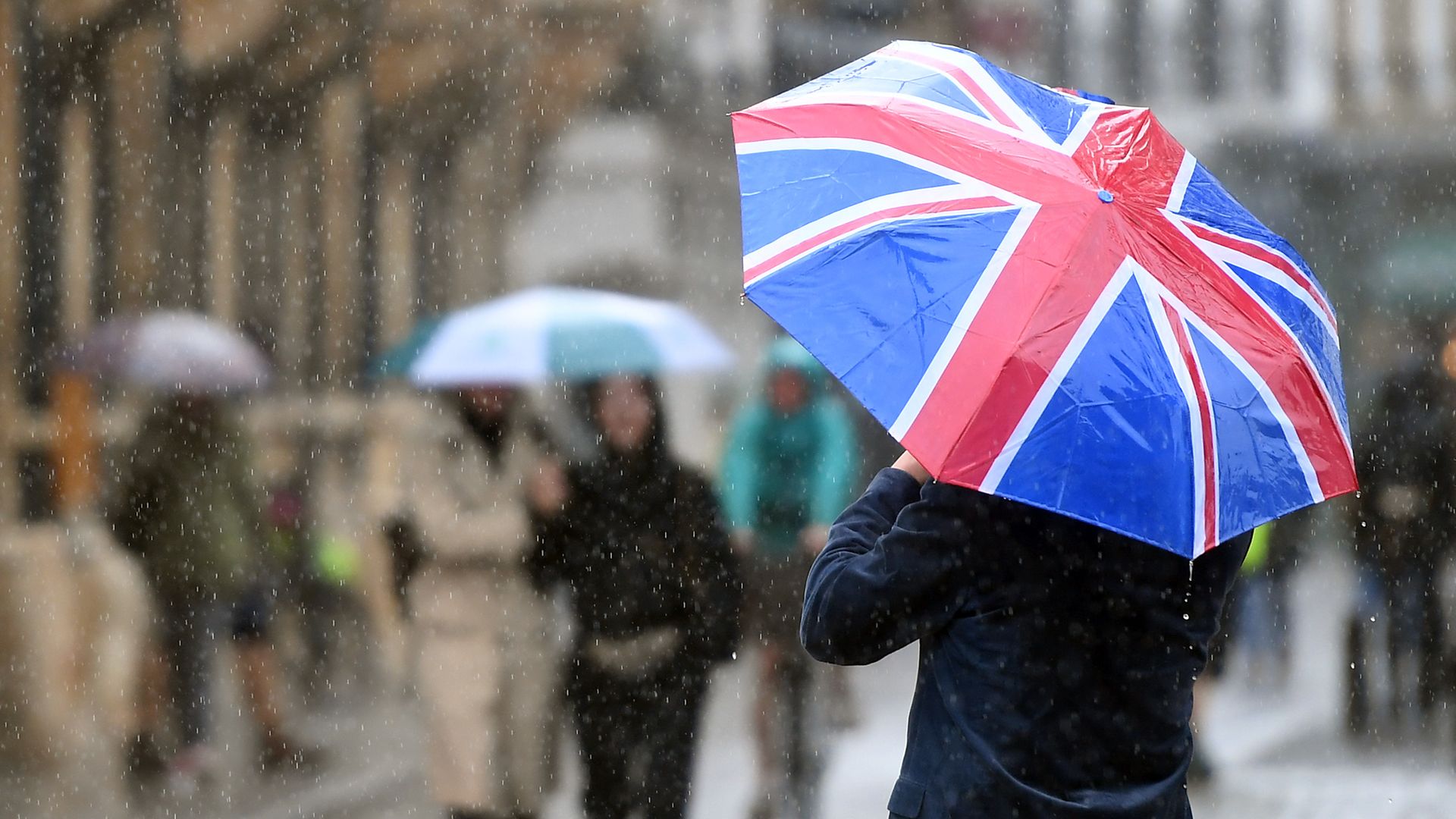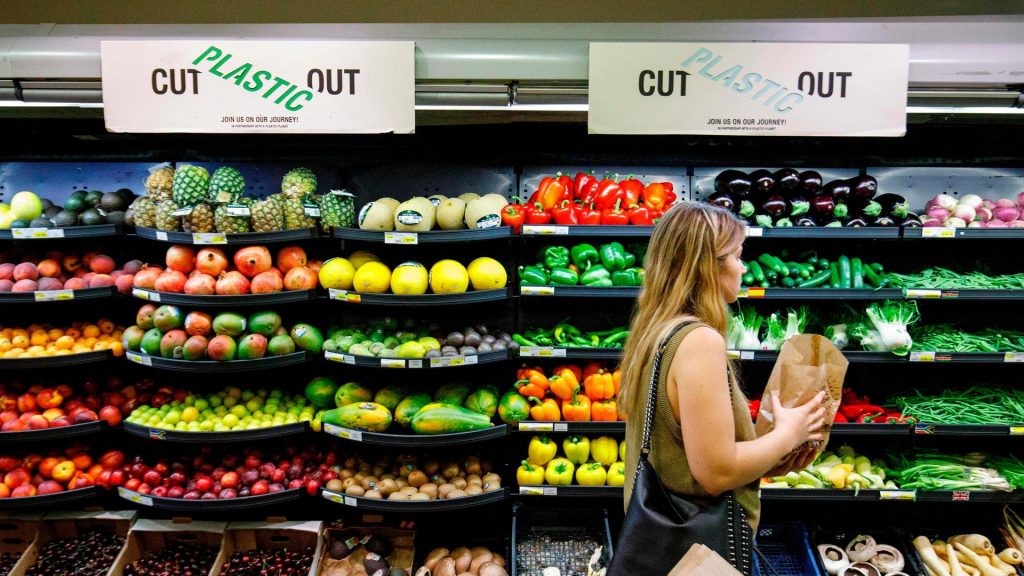
There has been a post-Brexit trend exhorting food shoppers to ‘buy British’. But just how feasible is it? And is it necessarily a good thing?
It is not just food. On the ‘Buy British’ Facebook group, recent requests for advice on UK-sourced homemade goods include everything from ‘leisure batteries’ to Lancashire sofa cushions. No, I didn’t know what leisure batteries were either: mostly, they are power sources for mobile homes.
Food, though, as it so often is, has become the foremost application in a new surge towards supporting British industry. Since Brexit, there has been a tectonic shift in consumerism as shoppers look to champion UK-made goods, aware as they are perhaps of the additional costs of trading with Europe, of the benefits of contributing to the national economy, and possibly also to supplement national pride.
Whatever the reason, this collective desire is plenty. Recently, there was concern in one Facebook group that Quaker Oats are apparently made in Dublin. Soon, other members were suggesting supermarket-own varieties, namely those produced by Aldi and Lidl, which are milled here on British shores, and are apparently still “smooth and creamy” when stirred with water as with milk.
Another social media post celebrated a bag of granulated sugar that displayed the words “proudly grown in Britain” on top of a Union Jack. One man shared a picture of a chocolate bar, going so far as to explain the fact it is not only manufactured in Stoke-on-Trent, but is also the work of a British-owned company. A double win, there, for British pride.
You would be right to say that supermarkets in Britain have long sold goods featuring Union Jack flags. They have espoused a homely agricultural ideal when it comes to beef, talking of ‘Welsh lamb’ and ‘West Country beef’, local cheeses and English wines. Today, they are maximising this output.
There has been an increasing number of flags on packaging. The retailers Aldi and Lidl, in a move maybe to counteract impressions they are German and reliant more on imports, have been heavier still with their trumpeting, it seems. Both have pages dedicated to British food on their websites, pledging to do more to buy from internal suppliers.
*****
Traditionally, the paradigm of culinary culture has been firmly cast as seasonal and artisan. It is about looking to our close countryside, where fruit and vegetables grow and are packed into handsome delivery boxes, and it is about recognising the tireless endeavour of the farmers who bring us the tenderest of steaks, if not the Romanians who pick our summer strawberries, a job we only want to do on Saturday afternoons for fun.
Running alongside this now, however, is this apparent shift towards British food not just for its cultural relevance, not only as an ethical, sustainable choice, but as a distinct and robust lifestyle choice, reflecting a pro-Brexit stance. The link is very evident from the discussion sites exhorting people to buy British.
It might turn-off those who identify as Remainers, but isn’t it ultimately a good thing? After all, when it comes to sustainability, limiting food miles and making the most of our lush pastures, sought after since before the Roman empire, are only good. Yes, we should be elevating our food sector, which has, over recent decades, been evolving, diversifying, and improving in quality. And, as the pandemic has shown, there is much to be said for shorter supply lines.
But just far can the ‘buy British’ exhortations get us? If we applied it to all our purchases, would we have the food to get by?
In short, no. We would run out by August, according to experts. The National Farmers’ Union says we are just over 60% efficient, and that is talking generally. When it comes to vegetables, we grow less than 50% of what we consume, and fruit is even less: we produce just 15% of what we eat.
“For an island nation, being able to feed our population is absolutely critical,” NFU president Minette Batters said recently. “Even as a global trading nation, shocks can expose fragilities in any reliance on imports. We all experienced the impact of this during lockdown.
“Imports will always play a crucial role in our food system but our own self-sufficiency must be paid more attention by the government. It is stagnating. We sit now at only 64% self-sufficiency, having fallen from over 75% in the mid-1980s.”
There are lots of reasons for this fall, and, granted, some of them are down to cheaper goods, such as Danish bacon, and Polish apples, being shipped in. There are arguments to suggest concentrating on British pork and apples would be a positive repositioning of resources.
But since the 1980s, the British food system has also become a whole lot more adventurous. French Camembert is basically a staple now, and slices of Iberico ham are hardly luxuries. We should probably not regress.
The farmer and author Joe Stanley says there has to be balance: “Is buying British fundamentally better? Just because it’s grown here doesn’t make it more sustainable.
“There is a lot to be proud about when it comes to British produce. We have the highest welfare standards in the world, some of the highest quality meat. When it comes to sustainability, let’s hope people buy British, and shop local, and support our industry. British consumers have been traditionally concerned with price, which is a more American mindset than a European one. So there’s a lot to celebrate if people are paying more attention to food.
“But it’s also a huge shame that the buy British mindset, this Union Jack patriotism, is getting tied up with nationalism. The petty flag use we see in our government is altering things.
“We’re having these conversations about buying British, and at the same time we are straying into an unfortunate nationalistic territory. We’re witnessing the toxification of the British brand.”
Stanley says Europe is as important as ever, both when importing and exporting food.

“We absolutely need to nurture trade links,” he says. “There’s a reason America is so desperate to sign a trade deal with us – because we’re a wealthy nation that imports a lot of food.
“It’s taken generations to foster relationships with our European partners to get the food system we have. Liz Truss thinks, ‘oh, Kuwait eats a lot of lamb, let’s go there’. Europe is full of wealthy people, and we should want to sell them our food.
“I’m sure people don’t want to go back to a diet of potatoes and cabbage. We were a culinary backwater. Everyone expects to be able to access a decent range of food. Sure, we should buy seasonal, and be local, but it cannot be only about that, realistically.”
The farmer and broadcaster Gareth Wyn Jones says the ‘buy British’ discourse is largely positive. After all, he says, last year was one of the best years for lamb, which was “up £1 per kilo”.
“I think it’s a really good thing. People are getting behind British agriculture. It’s about bloody time. We have a lot of bridges to cross.
“We should be adding to it – salad, fruit, veg. We need to be building that British economy on what we’re growing and eating. In the bigger picture we’ll be more sustainable, more seasonal, and with no added cost. We shouldn’t have strawberries in December and French beans from Kenya.”
But Wyn Jones adds that while the buying British sentiment is a welcome one, so too is continuing to nurture links with Europe.
“Diversity is good for food. We do have to ask ourselves, when it comes to cheaper food, ‘how is that produced?’ Do we want avocados brought in from Mexico, where its popularity is causing problems.
“But yes, as some who put Welsh lamb into Europe, I don’t want trade to stop. It’s one of the best products in the world. That’s why it’s imported. And yes, it works both ways. French Camembert. Spanish ham. Wine.
“But carrots – there is no reason why all our carrots shouldn’t be British. I was a Remainer. I want to stay in Europe. I’m not Nigel Farage screaming about buying British. But I’m also a farmer who cares about the environment, so there is a valid point to be made, however it’s dressed up.”
When it comes to carrots, we’re pretty good, actually. The British Carrot Growers Association says the UK grows approximately 800,000 tonnes of carrots annually and is self-sufficient for 11 months of the year.
Patterns get a little more drastic when it comes to food that favours a warmer locale. British tomato production amounts to about 92,000 metric tonnes per year, which is about a fifth of the total volume sold in the country in that timeframe, according to the British Tomato Growers’ Association.
We need to import over 400,000 tonnes of fresh tomatoes every year to meet demand. “The retail value of British tomato production… is around £190 million out of a total retail market value of £740 million,” the organisation explains. So we’d need a hell of a lot more polytunnels to get anywhere near self-sufficiency. Our pasta sauces and our salads would suffer for quite some time, never mind the investment required.
Sheffield University’s professor Duncan Cameron is the co-director of the Institute for Sustainable Food. He says we should be thinking about the sort of food system we want rather than how that system is acquired.
“Personally, and academically, I think the issue of self-sufficiency is a classic case of the wrong question.
“We talk of an air of Little England, and quasi-nationalism in relation to food. That might be present. But with sustainability and food security, we need to think about what sort of diet we want.
“When we talk about buying British, it’s difficult to know what that actually means. We generally do with lamb, but we all still want to drink coffee and eat mangoes. It’s hard to see how far it can go.
“Certainly there is a logical case to be made for a more local and seasonal food system. That’s usually the more sustainable option, but it isn’t always, even when taking food miles into account.
“Tomatoes are grown under the sun in Spain – they’re more sustainable than tomatoes grown here in a polytunnel. It’s not always that local is best.
“Another overlooked point is where does the labour come from? Say we did all buy British exclusively, who would grow and pick the fruit and vegetables? Around 30% of food manufacturing is filled by EU workers. It’s more in the summer.
“We need these skills and we have a heavy reliance on EU workers. Our food industry wouldn’t exist without a migrant workforce.”
It ought to be supposed that there might be a degree of shortsightedness in this sudden, overarching premise of buying British, not only as a regenerative motion but as a political standpoint.
It works in some aspects but falls well short in others. And as it pushes on, the tide of Union Flags waving triumphantly atop joints of roast pork and summer strawberries, let us spare a thought for bananas, and olive oil, for supermarkets would be all the more boring without them.
Dominic Goudie, the head of international trade at the Food and Drink Federation, is a force of balance if I am not: “UK manufacturers are committed customers of UK farming, and also depend on imports of ingredients that aren’t produced domestically or not in sufficient quantity. These imports complement our use of UK-produced inputs and are key to delivering the world-leading choice, quality and value for money enjoyed by UK shoppers.
“Ultimately, the UK’s food and drink manufacturing sector is driven by consumer demand and over time consumers have come to expect foods and ingredients from across the globe. It would require quite fundamental changes to the food supply chain and a huge reduction in product choice to move to a self-sustained system.”










